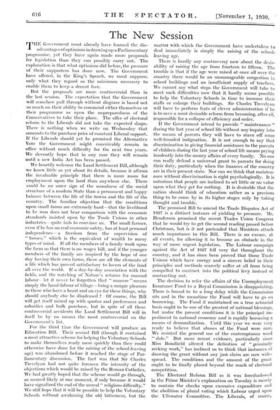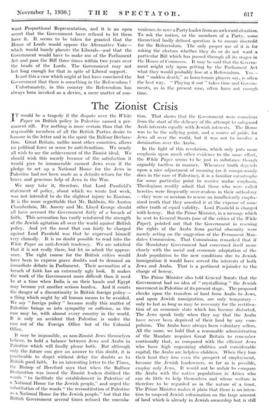The New Session
TILE Government must already have learned the
dis-
advantages of optimism in drawing up a Parliamentary programme, yet they have again made more proposals for legislation than they can possibly carry out. The explanation is that what optimism did before, the pressure of their supporters has done now. The Government have offered, in the King's Speech, we must suppose, only what they regard as the minimum necessary to enable them to keep a decent face.
But the proposals are more controversial than in the last session. The expectation that the Government will somehow pull through without disgrace is based not so much on their ability to commend either themselves or their programme as upon the unpreparedness of the Conservatives to take their place. The offer of electoral reform to the Liberals did not take the expected shape. There is nothing when we write on Wednesday that amounts to the purchase price of constant Liberal support. If the Liberals should yet be promised the Alternative Vote the Government might conceivably remain in office without much difficulty for the next two years. We devoutly hope that in any case they will remain until a new India Act has been passed.
We heartily welcome the Land Settlement Bill, although we know little as yet about its details, because it affirms the invaluable principle that there is more room for employment upon the land than anywhere else. There could be no surer sign of the soundness of the social structure of a modern State than a permanent and happy balance between the life of the towns and the life of the country. The familiar objection that the conditions upon small farms are extremely hard—that the livelihood to be won does not bear comparison with the economic standards insisted upon by the Trade Unions in other industries—quite fails to convince us. The small farmer, even if he has no real economic safety, has at least personal independence—a freedom from the supervision of " bosses," which is the equivalent of wealth to many types of mind. If all the members of a family work upon the farm so that there is no wages bill, and if the younger members of the family are inspired by the hope of one day having their own farms, there are all the elements of a life which has proved satisfactory to lovers of the land all over the world. If a day-by-day association with the fields, and the watching of Nature's returns for manual labour--let it never be forgotten that " manure " means simply the ]rand-labour of tillage—bring a unique pleasure to those who have a heart and an eye for these things, why should anybody else be displeased ? Of course, the Bill will get itself mixed up with quotas and preferences and subsidies and bulk purchase, but in spite of all these controversial accidents the Land Settlement Bill will in itself be by no means the most controversial on the Government's list.
For the third time the Government will produce an Education Bill. Their second Bill (though it contained a most attractive scheme for helping the Voluntary Schools to make themselves ready more quickly than they could otherwise have done for the raising of the school-leaving age) was abandoned before it reached the stage of Par- liamentary discussion. The fact was that Sir Charles Trevelyan had not quite foreseen the intensity of the objections which would be raised by the Roman Catholics. We had greatly hoped that the scheme would go through, as seemed likely at one moment, if only because it would have signalized the end of the unreal " religious difficulty." We still hope that it will be possible to help the Voluntary Schools without awakening the old bitterness, but the matter with which the Government have undertaken to deal immediately is simply the raising of the school- leaving age.
There is hardly any controversy now about the desir- ability of raising the age from fourteen to fifteen. The trouble is that if the age were raised at once all over the country there would be an unmanageable congestion in school buildings and an insufficient supply of teachers. We cannot say what steps the Government will take to meet such difficulties now that it hardly seems possible to help the Voluntary Schools in time to increase their staffs or enlarge their buildings. Sir Charles Trevelyan will have to perform feats of clever administration if he is to save a most desirable reform from becoming, after all, responsible for a collapse of efficiency and order.
If the Government intend to provide " maintenance " during the last year of school life without any inquiry into the means of parents they will have to stave off some well-founded indignation. It is not enough to say that discrimination in giving financial assistance to the parents of children during the last year of school life means prying insolently into the money affairs of every family. No one can really defend a universal grant to parents for doing their duty, particularly when the finances of the country arc in their present state. Nor can we think that mainten- ance without discrimination is right psychologically. It is notorious that people are inclined to set little or no value upon what they get for nothing. It is desirable that the nation should think of education rather as a precious thing to be come by in its higher stages only by taking thought and trouble.
The promised Bill to amend the Trade Disputes Act of 1927 is a distinct instance of yielding to pressure. Mr. Henderson promised the recent Trades Union Congress that he would try to get the second reading passed before Christmas, but is it not pretended that Ministers attach much importance to this Bill. There is no excuse, at all events, for allowing it to become an obstacle in the way of more urgent legislation. The Labour campaign against the Act of 1927 fell very flat throughout the country, and it has since been proved that those Trade Unions which have energy and a sincere belief in their principles and methods scarcely suffer at all from being compelled to contract into the political levy instead of contracting out.
The decision to refer the affairs of the Unemployment Insurance Fund to a Royal Commission is disappointing. There is bound to be a long delay while the Commission sits and in the meantime the Fund will have to go on borrowing. The Fund if maintained on a true actuarial basis ought to be one of the greatest of national blessings, but under the present conditions it is the principal im- pediment to national economy and is rapidly becoming a means of demoralization. Until this year we were very ready to believe that abuses of the Fund were rare. We resisted the general use of the contemptuous word " dole." But more recent evidence, particularly since Miss Bondfield altered the definition of " genuinely seeking work," has inclined us to think that instances of drawing the grant without any just claim are now wide- spread. The conditions and the amount of the grant ought to be finally placed beyond the reach of electoral competition.
The Electoral Reform Bill as it was foreshadowed in the Prime Minister's explanation on Tuesday is merely to contain the checks upon excessive expenditure and the abolition of plural voting which Labour urged upon the. Ullswater Committee. The Liberals, of course, want Proportional Representation, and it is an open secret that the Government have refused to let them have it. It seems to be taken for granted that the House of Lords would oppose the Alternative Vote— which would barely placate the Liberals—and that the Government would have to make use of the Parliament Act and pass the Bill three times within two years over the heads of the Lords. The Government may not last long enough for that in spite of Liberal support.
Is not this a case which might at last have convinced the Government that there is something in the Referendum ?
Unfortunately, in this country the Referendum has always been invoked as a device, a mere matter of con- venienee, to save a Party leader from an awkward situation. To--ask the nation, or the members of a Party, sonic theoretical badly defined question is to ensure discredit for the Referendum. The only proper use of it is for asking the electors whether they do or do not want a particular Bill which has passed through all its stages in the House of Commons. It may be said that the Govern- ment .might rely upon getting by the Parliament Act what they would probably lose at a Referendum. Yes— but " sudden death," as lawn-tennis players say, is often the best way. " Playing it out " takes time and Govern- ments, as in the present case, often have not enough time.











































 Previous page
Previous page